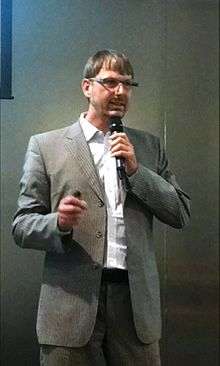Dirk Helbing

Dirk Helbing is a physicist, and professor of sociology, in particular of modelling and simulation.
Biography
Dirk Helbing studied physics and mathematics at the University of Göttingen. He completed his doctoral thesis at Stuttgart University, on modeling social processes by means of game-theoretical approaches, stochastic methods, and complex systems theory. In 1996, he completed further studies on traffic dynamics and optimization.
In 1998 he became Managing Director of the Institute for Transport and Economics at Dresden University of Technology, and in 2000, became a full professor. In 2008, Helbing was elected as a member of the German Academy of Sciences Leopoldina. He heads the ETH Zurich Competence Center "Coping with Crises in Complex Socio-Economic Systems" and the "Physics of Socio-Economic Systems" Division of the Deutsche Physikalische Gesellschaft (German Physical Society).
Research activities
Dirk Helbing is known for the social force model,[1] in particular its application to self-organising phenomena in pedestrian crowds.[2][3][4][5] Besides the slower-is-faster effect,[4] he introduced the freezing-by-heating effect [6] and the phase diagram of congested traffic states.[7][8] Helbing also proposed a microscopic foundation of evolutionary game theory [9] and has studied self-organized behavioral conventions.[10] Recent work applies principles of collective intelligence and self-organized control to the optimization of urban [11] and freeway traffic.[12] His current research activities focus on norms and conflict, the role of success-driven motion for the establishment of cooperation among selfish individuals,[13] the science of science,[14] socio-inspired technology and techno-social systems,[15] disaster spreading [16] and crisis management.[17]
Living Earth Simulator
He is the Principal Investigator on a project named FuturICT Knowledge Accelerator and Crisis Relief System, a computing system working on big datasets, conceived as sort of a crystal ball of the world.[18] The core of the system is the Living Earth Simulator, a computing machine attempting "to model global-scale systems — economies, governments, cultural trends, epidemics, agriculture, technological developments, and more — using torrential data streams, sophisticated algorithms, and as much hardware as it takes".[18] The project has lost in the final round of application for funding from the European Commission of €1 billion.[18]
Footnotes
- ↑ http://www.researcherid.com/rid/C-6114-2008
- ↑ Helbing, Dirk; Molnár, Péter (1995). "Social force model for pedestrian dynamics". Physical Review E. 51 (5): 4282–4286. arXiv:cond-mat/9805244
 . Bibcode:1995PhRvE..51.4282H. doi:10.1103/PhysRevE.51.4282.
. Bibcode:1995PhRvE..51.4282H. doi:10.1103/PhysRevE.51.4282. - ↑ Helbing, Dirk; Molnár, Péter; Farkas, Illés J; Bolay, Kai (2001). "Self-organizing pedestrian movement". Environment and Planning B. 28 (3): 361–383. doi:10.1068/b2697.
- 1 2 Helbing, Dirk; Farkas, Illés; Vicsek, Tamás (2000). "Simulating dynamical features of escape panic". Nature. 407 (6803): 487–490. arXiv:cond-mat/0009448
 . Bibcode:2000Natur.407..487H. doi:10.1038/35035023. PMID 11028994.
. Bibcode:2000Natur.407..487H. doi:10.1038/35035023. PMID 11028994. - ↑ Helbing, Dirk; Buzna, Lubos; Johansson, Anders; Werner, Torsten (2005). "Self-organized pedestrian crowd dynamics: Experiments, simulations, and design solutions". Transportation Science. 39 (1): 1–24. doi:10.1287/trsc.1040.0108.
- ↑ Helbing, Dirk; Farkas, Illés J; Vicsek, Tamás; Werner, Torsten (2000). "Freezing by heating in a driven mesoscopic system". Physical Review Letters. 84 (6): 1240–1243. arXiv:cond-mat/9904326
 . Bibcode:2000PhRvL..84.1240H. doi:10.1103/PhysRevLett.84.1240. PMID 11017488.
. Bibcode:2000PhRvL..84.1240H. doi:10.1103/PhysRevLett.84.1240. PMID 11017488. - ↑ Helbing, Dirk; Treiber, Martin (1998). "Gas-kinetic-based traffic model explaining observed hysteretic phase transition". Physical Review Letters. 81 (14): 3042–3045. arXiv:cond-mat/9810277
 . Bibcode:1998PhRvL..81.3042H. doi:10.1103/PhysRevLett.81.3042.
. Bibcode:1998PhRvL..81.3042H. doi:10.1103/PhysRevLett.81.3042. - ↑ Helbing, Dirk; Treiber, Martin (2008). "Derivation of a fundamental diagram for urban traffic flow". European Physical Journal B. 70 (2): 229–241. arXiv:0807.1843
 . Bibcode:2009EPJB...70..229H. doi:10.1140/epjb/e2009-00093-7.
. Bibcode:2009EPJB...70..229H. doi:10.1140/epjb/e2009-00093-7. - ↑ A mathematical model for behavioral changes by pair interactions, D. Helbing (1992) Pages 330-348 in: G. Haag, U. Mueller, and K. G. Troitzsch (eds.) Economic Evolution and Demographic Change. Formal Models in Social Sciences (Springer, Berlin).
- ↑ A mathematical model for the behavior of individuals in a social field, D. Helbing (1994). Journal of Mathematical Sociology 19 (3), 189-219.
- ↑ Lämmler, Stefan; Helbing, Dirk (2008). "Self-control of traffic lights and vehicle flows in urban road networks". JSTAT. 2008 (04): P04019. arXiv:0802.0403
 . Bibcode:2008JSMTE..04..019L. doi:10.1088/1742-5468/2008/04/P04019.
. Bibcode:2008JSMTE..04..019L. doi:10.1088/1742-5468/2008/04/P04019. - ↑ Kesting, Arne; Treiber, Martin; Schönhof, Martin; Helbing, Dirk (2008). "Adaptive cruise control design for active congestion avoidance". Transportation Research C. 16 (6): 668–683. doi:10.1016/j.trc.2007.12.004.
- ↑ Helbing, Dirk; Yu, Wenjian (2009). "The outbreak of cooperation among success-driven individuals under noisy conditions". Proceedings of the National Academy of Sciences of the United States of America. 106 (10): 3680–3685. arXiv:0903.4054
 . Bibcode:2009PNAS..106.3680H. doi:10.1073/pnas.0811503106. PMC 2646628
. Bibcode:2009PNAS..106.3680H. doi:10.1073/pnas.0811503106. PMC 2646628 . PMID 19237576.
. PMID 19237576. - ↑ www.livingscience.eu
- ↑ www.qlectives.eu
- ↑ Simonsen, Ingve; Buzna, Lubos; Peters, Karsten; Bornholdt, Stefan; Helbing, Dirk (2008). "Transient dynamics increasing network vulnerability to cascading failures". Physical Review Letters. 100 (21): 1–4. arXiv:0704.1952
 . Bibcode:2008PhRvL.100u8701S. doi:10.1103/PhysRevLett.100.218701. PMID 18518644.
. Bibcode:2008PhRvL.100u8701S. doi:10.1103/PhysRevLett.100.218701. PMID 18518644. - ↑ Buzna, Lubos; Peters, Karsten; Ammoser, Hendrik; Kühnert, Christian; Helbing, Dirk (2007). "Efficient response to cascading disaster spreading". Physical Review E. 75 (5): 056107. arXiv:physics/0611244
 . Bibcode:2007PhRvE..75e6107B. doi:10.1103/PhysRevE.75.056107.
. Bibcode:2007PhRvE..75e6107B. doi:10.1103/PhysRevE.75.056107. - 1 2 3 David Weinberger, The Machine That Would Predict the Future,Scientific American, Dec 2011, Vol. 305, Issue no. 6
External links
- Homepage of ETH Zurich's Chair of Sociology, in particular of Modeling and Simulation (SOMS)
- Publication list of Dirk Helbing
- Selected papers in Game Theory and Traffic Theory
- Scientific videos and animations
- Living Science project